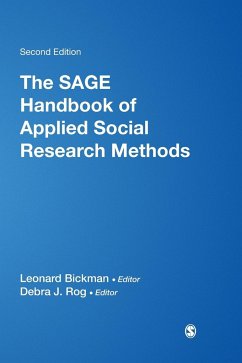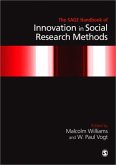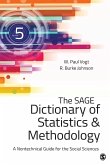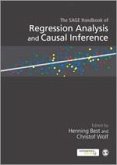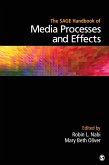- Gebundenes Buch
- Merkliste
- Auf die Merkliste
- Bewerten Bewerten
- Teilen
- Produkt teilen
- Produkterinnerung
- Produkterinnerung
This Handbook addresses the methodology of social science research and the appropriate use of different methods.
Andere Kunden interessierten sich auch für
![The SAGE Handbook of Innovation in Social Research Methods The SAGE Handbook of Innovation in Social Research Methods]() The SAGE Handbook of Innovation in Social Research Methods61,99 €
The SAGE Handbook of Innovation in Social Research Methods61,99 €![The SAGE Handbook of Organizational Behavior The SAGE Handbook of Organizational Behavior]() The SAGE Handbook of Organizational Behavior179,99 €
The SAGE Handbook of Organizational Behavior179,99 €![The SAGE Dictionary of Statistics & Methodology The SAGE Dictionary of Statistics & Methodology]() W. Vogt (William) PaulThe SAGE Dictionary of Statistics & Methodology96,99 €
W. Vogt (William) PaulThe SAGE Dictionary of Statistics & Methodology96,99 €![The SAGE Handbook of Qualitative Methods in Health Research The SAGE Handbook of Qualitative Methods in Health Research]() The SAGE Handbook of Qualitative Methods in Health Research58,99 €
The SAGE Handbook of Qualitative Methods in Health Research58,99 €![The SAGE Handbook of Regression Analysis and Causal Inference (First Edition) The SAGE Handbook of Regression Analysis and Causal Inference (First Edition)]() The SAGE Handbook of Regression Analysis and Causal Inference (First Edition)181,99 €
The SAGE Handbook of Regression Analysis and Causal Inference (First Edition)181,99 €![The SAGE Handbook of Case-Based Methods The SAGE Handbook of Case-Based Methods]() The SAGE Handbook of Case-Based Methods56,99 €
The SAGE Handbook of Case-Based Methods56,99 €![The SAGE Handbook of Media Processes and Effects The SAGE Handbook of Media Processes and Effects]() Robin L. NabiThe SAGE Handbook of Media Processes and Effects177,99 €
Robin L. NabiThe SAGE Handbook of Media Processes and Effects177,99 €-
-
-
This Handbook addresses the methodology of social science research and the appropriate use of different methods.
Hinweis: Dieser Artikel kann nur an eine deutsche Lieferadresse ausgeliefert werden.
Hinweis: Dieser Artikel kann nur an eine deutsche Lieferadresse ausgeliefert werden.
Produktdetails
- Produktdetails
- Verlag: SAGE Publications Inc
- 2 Revised edition
- Seitenzahl: 680
- Erscheinungstermin: 27. August 2008
- Englisch
- Abmessung: 260mm x 183mm x 41mm
- Gewicht: 1428g
- ISBN-13: 9781412950312
- ISBN-10: 1412950317
- Artikelnr.: 24667868
- Herstellerkennzeichnung
- Libri GmbH
- Europaallee 1
- 36244 Bad Hersfeld
- gpsr@libri.de
- Verlag: SAGE Publications Inc
- 2 Revised edition
- Seitenzahl: 680
- Erscheinungstermin: 27. August 2008
- Englisch
- Abmessung: 260mm x 183mm x 41mm
- Gewicht: 1428g
- ISBN-13: 9781412950312
- ISBN-10: 1412950317
- Artikelnr.: 24667868
- Herstellerkennzeichnung
- Libri GmbH
- Europaallee 1
- 36244 Bad Hersfeld
- gpsr@libri.de
Leonard Bickman, Ph.D., is Professor of Psychology, Psychiatry and Public Policy. He is director of the Center for Evaluation and Program Improvement and Associate Dean for Research at Peabody College. He earned his Ph.D. in psychology (social) from the City University of New York, his master′s degree in experimental psychopathology from Columbia University and his bachelor′s from the City College of New York. Professor Bickman is a nationally recognized leader in program evaluation and mental healthservices research on children and adolescents. He has published more than 15 books and monographs and 180 articles and chapters and has been principal investigator on over 25 major grants from several agencies. He is co-editor of the Applied Research Methods Series published by Sage Publications since 1980. He is also co-editor of the Handbook of Applied Social Research and is collaborating on a new International Handbook of Social Research. He is the co-author of the very popular book Applied Research Design: A Practical Guide. Debra J. Rog, Ph.D., is a Senior Research Associate with the Center for Evaluation and Program Improvement (CEPI), and directs its Washington office. She has over 25 years of experience in program evaluation and applied research and has directed numerous multi-site evaluations and research projects involving issues of poverty, homelessness, housing and services for vulnerable populations including children and families, mental health, and others. Currently, she is the Principal Investigator of a Coordinating Center for the Substance Abuse and Mental Health Administration′s Homeless Families Initiative, and two foundation-funded cross-site evaluations of local collaboratives focused on violence prevention. Dr. Rog has to her credit numerous publications on evaluation methodology, housing, homelessness, poverty, mental health, and program and policy development and has edited numerous substantive and methodological volumes, including the Applied Social Research Methods Series and the Handbook of Applied Social Research Methods. She has served on the Board of Directors of the American Evaluation Association, and is a member of the American Psychological Association, the American Psychological Society, and the American Public Health Association. She completed an appointment on the Advisory Committee of Women′s Services for the U.S. Substance Abuse and Mental Health Services Administration, and has been recognized for her evaluation work by the National Institute of Mental Health, the American Evaluation Association, the Eastern Evaluation Research Society, and the Knowledge Utilization Society.
INTRODUCTION
WHY A HANDBOOK OF APPLIED SOCIAL RESEARCH? - Leonard Bickman & Debra J. Rog
PART I. APPROACHES TO APPLIED RESEARCH
1. Applied Research Design - Leonard Bickman & Debra J. Rog
2. Design Sensitivity: Statistical Power for Applied Experimental Research
- Mark W. Lipsey & Sean M. Hurley
3. Practical Sampling - Gary T. Henry
4. Planning Ethically Responsible Research - Joan E. Sieber
PART II. APPLIED RESEARCH DESIGNS
5. Randomized Controlled Trials for Evaluation and Planning - Robert F.
Boruch, David Weisburd, Herbert M.Turner III, Allison Karpyn & Julia
Littell
6. Quasi-experimentation - Melvin A. Mark & Charles S. Reichardt
7. Designing a Qualitative Study - Joseph A. Maxwell
8. How to Do Better Case Studies (with Illustrations from 20 Exemplary Case
Studies) - Robert K. Yin
9. Integrating Qualitative and Quantitative Approaches to Research - Abbas
Tashakkori & Charles Teddlie
10. Organizational Diagnosis - Michael I. Harrison
11. Research Synthesis and Meta-analysis - Harris M. Cooper, Erika A.
Patall & James J. Lindsay
PART III. PRACTICAL DATA COLLECTION
12. Design and Evaluation of Survey Questions - Floyd J. Fowler Jr. & Carol
Cosenza
13. Internet Survey Methods - Samuel J. Best & Chase H. Harrison
14. Concept Mapping for Applied Social Research - Mary Kane & William
Trochim
15. Mail Surveys - Thomas W. Mangione & Janet H. Van Ness
16. Methods for Sampling and Interviewing in Telephone Surveys - Paul J.
Lavrakas
17. Ethnography - David M. Fetterman
18. Group Depth Interviews: Focus Group Research - David W. Stewart, Prem
N. Shamdasani & Dennis W. Rook
Applied Research Design - Leonard Bickman, Debra Rog
Designing a Qualitative Study - Joseph Maxwell
Practical Sampling - Gary Henry
Planning Ethically Responsible Research - Joan Sieber
Randomized Controlled Experiements for Evaluation - Robert Boruch
Quasi-Experimentation - Melvin Mark, Charles Reichardt
Abridged Version of Case Study Research: Design and Method - Robert Yin
Research Synthesis and Meta-Analysis - Harris Cooper, Erika Patall, James
Lindsay
Design and Evaluation of Survey Questions - Floyd Fowler, Carol Cosenza
Organizational Diagnosis and Assessment - Michael Harrison
Mail Surveys - Thomas Mangione
Methods for Sampling and Interviewing in Telephone Surveys - Paul Lavrakas
Ethnography - David Fetterman
Focus Group Research: Exploration andDiscovery - David Stewart, Prem
Shamdasani, Dennis Rook
Concept Mapping - Mary Kane, William Trochim
Internet Data Collection - Samuel Best
Mixed Methods - Abbas Tashakkori, Charles Teddlie
Comparative Analysis - Benoit Rihoux, Charles Ragin
WHY A HANDBOOK OF APPLIED SOCIAL RESEARCH? - Leonard Bickman & Debra J. Rog
PART I. APPROACHES TO APPLIED RESEARCH
1. Applied Research Design - Leonard Bickman & Debra J. Rog
2. Design Sensitivity: Statistical Power for Applied Experimental Research
- Mark W. Lipsey & Sean M. Hurley
3. Practical Sampling - Gary T. Henry
4. Planning Ethically Responsible Research - Joan E. Sieber
PART II. APPLIED RESEARCH DESIGNS
5. Randomized Controlled Trials for Evaluation and Planning - Robert F.
Boruch, David Weisburd, Herbert M.Turner III, Allison Karpyn & Julia
Littell
6. Quasi-experimentation - Melvin A. Mark & Charles S. Reichardt
7. Designing a Qualitative Study - Joseph A. Maxwell
8. How to Do Better Case Studies (with Illustrations from 20 Exemplary Case
Studies) - Robert K. Yin
9. Integrating Qualitative and Quantitative Approaches to Research - Abbas
Tashakkori & Charles Teddlie
10. Organizational Diagnosis - Michael I. Harrison
11. Research Synthesis and Meta-analysis - Harris M. Cooper, Erika A.
Patall & James J. Lindsay
PART III. PRACTICAL DATA COLLECTION
12. Design and Evaluation of Survey Questions - Floyd J. Fowler Jr. & Carol
Cosenza
13. Internet Survey Methods - Samuel J. Best & Chase H. Harrison
14. Concept Mapping for Applied Social Research - Mary Kane & William
Trochim
15. Mail Surveys - Thomas W. Mangione & Janet H. Van Ness
16. Methods for Sampling and Interviewing in Telephone Surveys - Paul J.
Lavrakas
17. Ethnography - David M. Fetterman
18. Group Depth Interviews: Focus Group Research - David W. Stewart, Prem
N. Shamdasani & Dennis W. Rook
Applied Research Design - Leonard Bickman, Debra Rog
Designing a Qualitative Study - Joseph Maxwell
Practical Sampling - Gary Henry
Planning Ethically Responsible Research - Joan Sieber
Randomized Controlled Experiements for Evaluation - Robert Boruch
Quasi-Experimentation - Melvin Mark, Charles Reichardt
Abridged Version of Case Study Research: Design and Method - Robert Yin
Research Synthesis and Meta-Analysis - Harris Cooper, Erika Patall, James
Lindsay
Design and Evaluation of Survey Questions - Floyd Fowler, Carol Cosenza
Organizational Diagnosis and Assessment - Michael Harrison
Mail Surveys - Thomas Mangione
Methods for Sampling and Interviewing in Telephone Surveys - Paul Lavrakas
Ethnography - David Fetterman
Focus Group Research: Exploration andDiscovery - David Stewart, Prem
Shamdasani, Dennis Rook
Concept Mapping - Mary Kane, William Trochim
Internet Data Collection - Samuel Best
Mixed Methods - Abbas Tashakkori, Charles Teddlie
Comparative Analysis - Benoit Rihoux, Charles Ragin
INTRODUCTION
WHY A HANDBOOK OF APPLIED SOCIAL RESEARCH? - Leonard Bickman & Debra J. Rog
PART I. APPROACHES TO APPLIED RESEARCH
1. Applied Research Design - Leonard Bickman & Debra J. Rog
2. Design Sensitivity: Statistical Power for Applied Experimental Research
- Mark W. Lipsey & Sean M. Hurley
3. Practical Sampling - Gary T. Henry
4. Planning Ethically Responsible Research - Joan E. Sieber
PART II. APPLIED RESEARCH DESIGNS
5. Randomized Controlled Trials for Evaluation and Planning - Robert F.
Boruch, David Weisburd, Herbert M.Turner III, Allison Karpyn & Julia
Littell
6. Quasi-experimentation - Melvin A. Mark & Charles S. Reichardt
7. Designing a Qualitative Study - Joseph A. Maxwell
8. How to Do Better Case Studies (with Illustrations from 20 Exemplary Case
Studies) - Robert K. Yin
9. Integrating Qualitative and Quantitative Approaches to Research - Abbas
Tashakkori & Charles Teddlie
10. Organizational Diagnosis - Michael I. Harrison
11. Research Synthesis and Meta-analysis - Harris M. Cooper, Erika A.
Patall & James J. Lindsay
PART III. PRACTICAL DATA COLLECTION
12. Design and Evaluation of Survey Questions - Floyd J. Fowler Jr. & Carol
Cosenza
13. Internet Survey Methods - Samuel J. Best & Chase H. Harrison
14. Concept Mapping for Applied Social Research - Mary Kane & William
Trochim
15. Mail Surveys - Thomas W. Mangione & Janet H. Van Ness
16. Methods for Sampling and Interviewing in Telephone Surveys - Paul J.
Lavrakas
17. Ethnography - David M. Fetterman
18. Group Depth Interviews: Focus Group Research - David W. Stewart, Prem
N. Shamdasani & Dennis W. Rook
Applied Research Design - Leonard Bickman, Debra Rog
Designing a Qualitative Study - Joseph Maxwell
Practical Sampling - Gary Henry
Planning Ethically Responsible Research - Joan Sieber
Randomized Controlled Experiements for Evaluation - Robert Boruch
Quasi-Experimentation - Melvin Mark, Charles Reichardt
Abridged Version of Case Study Research: Design and Method - Robert Yin
Research Synthesis and Meta-Analysis - Harris Cooper, Erika Patall, James
Lindsay
Design and Evaluation of Survey Questions - Floyd Fowler, Carol Cosenza
Organizational Diagnosis and Assessment - Michael Harrison
Mail Surveys - Thomas Mangione
Methods for Sampling and Interviewing in Telephone Surveys - Paul Lavrakas
Ethnography - David Fetterman
Focus Group Research: Exploration andDiscovery - David Stewart, Prem
Shamdasani, Dennis Rook
Concept Mapping - Mary Kane, William Trochim
Internet Data Collection - Samuel Best
Mixed Methods - Abbas Tashakkori, Charles Teddlie
Comparative Analysis - Benoit Rihoux, Charles Ragin
WHY A HANDBOOK OF APPLIED SOCIAL RESEARCH? - Leonard Bickman & Debra J. Rog
PART I. APPROACHES TO APPLIED RESEARCH
1. Applied Research Design - Leonard Bickman & Debra J. Rog
2. Design Sensitivity: Statistical Power for Applied Experimental Research
- Mark W. Lipsey & Sean M. Hurley
3. Practical Sampling - Gary T. Henry
4. Planning Ethically Responsible Research - Joan E. Sieber
PART II. APPLIED RESEARCH DESIGNS
5. Randomized Controlled Trials for Evaluation and Planning - Robert F.
Boruch, David Weisburd, Herbert M.Turner III, Allison Karpyn & Julia
Littell
6. Quasi-experimentation - Melvin A. Mark & Charles S. Reichardt
7. Designing a Qualitative Study - Joseph A. Maxwell
8. How to Do Better Case Studies (with Illustrations from 20 Exemplary Case
Studies) - Robert K. Yin
9. Integrating Qualitative and Quantitative Approaches to Research - Abbas
Tashakkori & Charles Teddlie
10. Organizational Diagnosis - Michael I. Harrison
11. Research Synthesis and Meta-analysis - Harris M. Cooper, Erika A.
Patall & James J. Lindsay
PART III. PRACTICAL DATA COLLECTION
12. Design and Evaluation of Survey Questions - Floyd J. Fowler Jr. & Carol
Cosenza
13. Internet Survey Methods - Samuel J. Best & Chase H. Harrison
14. Concept Mapping for Applied Social Research - Mary Kane & William
Trochim
15. Mail Surveys - Thomas W. Mangione & Janet H. Van Ness
16. Methods for Sampling and Interviewing in Telephone Surveys - Paul J.
Lavrakas
17. Ethnography - David M. Fetterman
18. Group Depth Interviews: Focus Group Research - David W. Stewart, Prem
N. Shamdasani & Dennis W. Rook
Applied Research Design - Leonard Bickman, Debra Rog
Designing a Qualitative Study - Joseph Maxwell
Practical Sampling - Gary Henry
Planning Ethically Responsible Research - Joan Sieber
Randomized Controlled Experiements for Evaluation - Robert Boruch
Quasi-Experimentation - Melvin Mark, Charles Reichardt
Abridged Version of Case Study Research: Design and Method - Robert Yin
Research Synthesis and Meta-Analysis - Harris Cooper, Erika Patall, James
Lindsay
Design and Evaluation of Survey Questions - Floyd Fowler, Carol Cosenza
Organizational Diagnosis and Assessment - Michael Harrison
Mail Surveys - Thomas Mangione
Methods for Sampling and Interviewing in Telephone Surveys - Paul Lavrakas
Ethnography - David Fetterman
Focus Group Research: Exploration andDiscovery - David Stewart, Prem
Shamdasani, Dennis Rook
Concept Mapping - Mary Kane, William Trochim
Internet Data Collection - Samuel Best
Mixed Methods - Abbas Tashakkori, Charles Teddlie
Comparative Analysis - Benoit Rihoux, Charles Ragin

